Author: Yu Wufei, Xu Jingjing, Sanlian Life Weekly
On March 18th, local time in the UK, 42-year-old British Chinese Jian Wen was found guilty of "participating in money laundering" by a British court and could face up to 14 years in prison. Jian Wen's defense lawyer Mark Harries told this magazine that due to the judge's busy schedule, the final sentencing of Jian Wen, originally scheduled for May 10th, has been postponed to May 24th.
Jian Wen served the interests of Qian Zhimin, who had deceived more than 120,000 Chinese investors. On April 24th, local time, Qian Zhimin appeared in court in London. She was accused of obtaining, using, or holding cryptocurrency related to the crime in London and other parts of the UK from October 1, 2017, to April 23, 2024, which originated from her massive economic fraud in China.
During the investigation of Jian and Qian, the British police seized over 61,000 bitcoins, the largest amount of cryptocurrency ever seized in the UK (based on the exchange rate of 1 bitcoin to approximately £50,190 on May 10th, valued at approximately £3.06 billion).
As the "housekeeper and translator" for Qian in the UK, Jian Wen was born into an ordinary Chinese family and came to the UK in 2007. She did various physical jobs and had long hoped to achieve upward mobility overseas through legitimate channels. Throughout the six-year investigation and two-year trial, a question has always existed: in order to change her fate in a foreign land, did Jian Wen willingly become an accomplice of an international fraud suspect, or was she manipulated into becoming a victim?
In August 2017, a Chinese takeout restaurant in Abbey Wood, southeast London, welcomed a new employee. 36-year-old Jian Wen had moved from Leeds, marking her tenth year of struggling in the UK.

Jian Wen herself (Image | British Police)
During these ten years, Jian Wen traveled around the UK. According to Sky News in the UK, in 2007, 26-year-old, petite Jian Wen, seven months pregnant, arrived in Halifax, a small rural town in the north of England, with a spousal visa obtained through her British husband she met in China.
Halifax, with a population of 80,000, is full of 19th-century Victorian buildings in the town center. In the eyes of the British, it represents an affordable quality of life and picturesque scenery. However, according to Jian Wen's account, life there was not happy. Her husband was very controlling and abusive, and the two divorced in 2010, with Jian taking care of their child. In the same year, she sent the child back to China and moved to Leeds, 30 kilometers away.
Leeds is the nearest major city to Halifax and has a larger Chinese community. Jian Wen immersed herself in the Chinese working circle, taking various physical jobs to make a living. According to the "Opening Notes" submitted to the court by the Crown Prosecution Service, Jian Wen mostly worked in part-time jobs at Chinese takeout restaurants in Leeds and frequently changed residences. In 2011 alone, she moved three times: to an attic in a takeout restaurant, to an adjacent building of a takeout restaurant, and to a shared room in a cheap apartment building with a colleague.
This hand-to-mouth, unsettled life was clearly not what Jian Wen had expected. Before meeting her ex-husband in China, she obtained a law degree from a university in China and had bigger dreams. Jackson, a London real estate agent who had met Jian Wen, remembered her saying that she really wanted to become a lawyer. In Leeds, despite the hardships, she obtained a bachelor's degree in economics and took some law courses, according to Sky News in the UK.
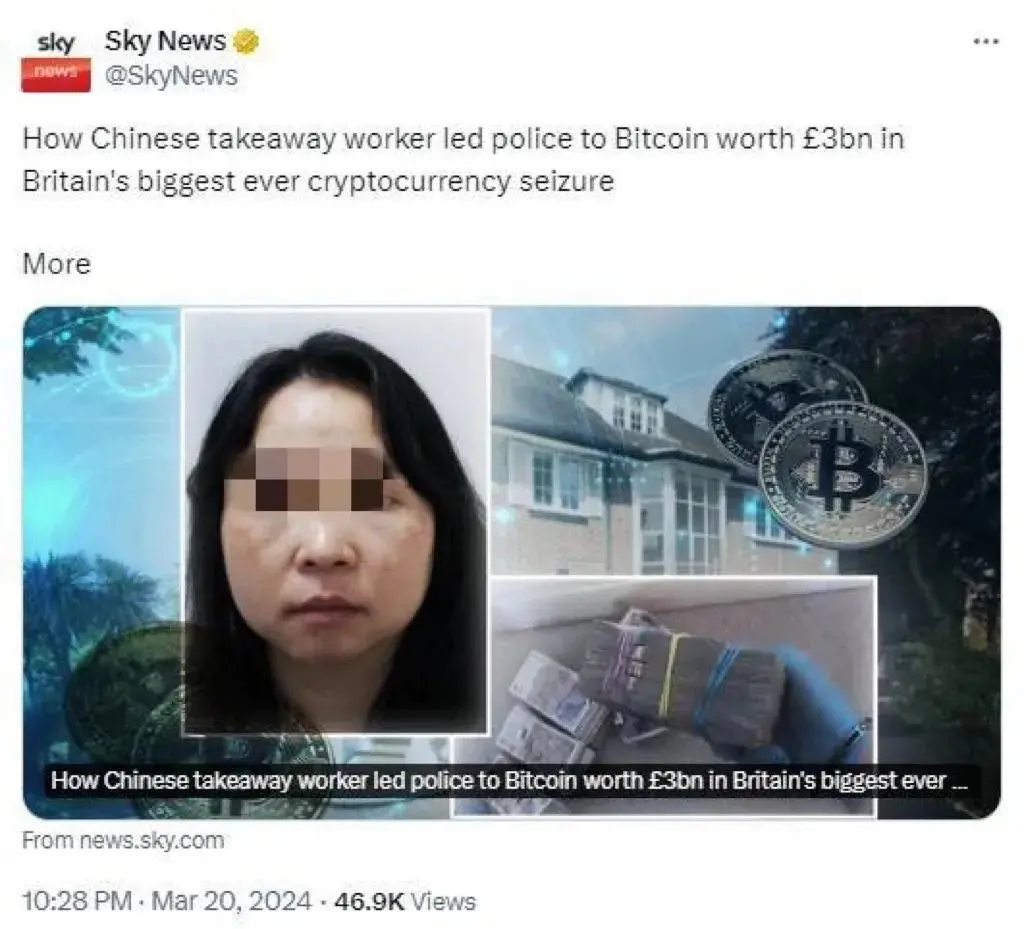
Image | "Sky News" Twitter
However, these efforts did not seem to reflect in her income. According to statistics from the UK tax authority, in 2015, Jian Wen was still working in a Chinese takeout restaurant, declaring an annual income of £12,800 (approximately RMB 116,000 at current prices); in 2016, she switched to a trading company importing goods from China, but her reported income shrank to £5,979 (approximately RMB 54,200).
Perhaps out of a fantasy for wealth, Jian Wen also dabbled in the booming Bitcoin market. From December 30, 2016, to May 26, 2017, the price of one Bitcoin in pounds soared from £788 to £1,639, more than doubling in value. Encouraged by this, at the end of May 2017, Jian Wen registered accounts on two Bitcoin trading platforms headquartered in the UK and Denmark.
Moving to Abbey Wood, a London suburb belonging to London but with lower living costs, was another effort by Jian Wen. Li Ting, who had worked at a Chinese takeout restaurant in Abbey Wood, told this magazine that in this community, both the employees and the bosses "come and go quickly, and generally no one knows each other." Everyone sees it as a stepping stone, seeking better job opportunities through fellow countrymen, friends, London Chinese forums, and professional introduction WeChat groups.
Like many other Chinese people, Jian Wen also joined a WeChat group that connected to job opportunities for Chinese workers. According to her testimony in court, within a month of moving to London in August 2017, she applied for dozens of jobs. In mid-September 2017, Jian Wen saw an advertisement in the group for a Chinese assistant and called the number on the ad directly. The voice on the other end of the phone asked her to interview with the employer at the Royal Garden Hotel, a five-star hotel on a major shopping street in London.
At the Royal Garden Hotel, Jian Wen met "Zhang Yadi" for the first time. "Zhang Yadi" held a passport from the Federation of Saint Kitts and Nevis in the Caribbean, but had a Chinese face. Jian Wen said in court that she found "Zhang Yadi" to have a disability from a car accident, with heavy breathing, but she looked very young and had delicate skin while wearing a traditional Thai skirt. Zhang Yadi told her that she had a multinational jewelry business and wanted Jian Wen to be her "carer and translator," helping her buy new clothes, open a bank account, and find a place to live.
Jian Wen and her legal team later emphasized in court that she saw this as a good opportunity to change her fate. Indeed, bidding farewell to the Chinese takeout restaurant, Jian Wen entered another world in London.
Every month, "Zhang Yadi" paid Jian Wen £4,000 in cash. Less than three weeks after they met, they moved into a six-bedroom mansion in Hampstead, a wealthy area in north London, with a monthly rent as high as £17,300. Hampstead, adorned with ponds and greenery, not only has the largest number of millionaires in the UK and some of the most expensive houses, but is also famous for its literary celebrity homes, restaurants, and cafes.
At the luxurious and ornate Harrods, a top global luxury department store, Jian Wen became a member and purchased several items of clothing, shoes, and jewelry from renowned designers worth over £92,500 between September and December 2017. After becoming a "carer," Jian Wen vented in her diary: "Fxxx u. The person who said 'you're poor': Watch me how I grow millions!!!"
The Beginning
According to the records of the British prosecution, just two or three days before meeting Jian Wen, Qian Zhimin entered London in September 2017 with a passport from Saint Kitts and Nevis. In the UK, the 1978-born Qian Zhimin transformed into "Zhang Yadi," born in Hubei, China in 1990, with short black hair and fair skin.
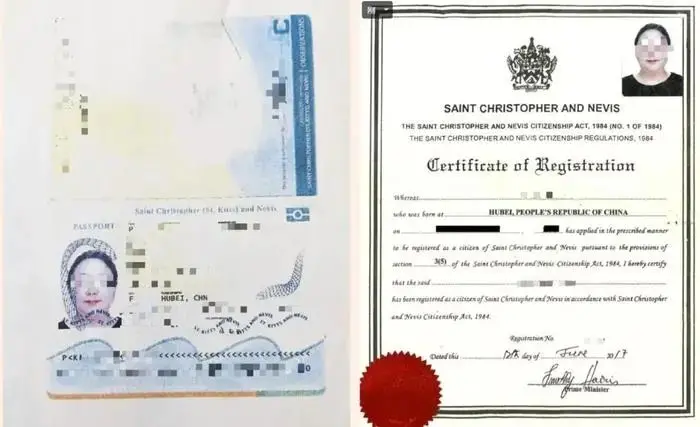
Image | "Sky News" Twitter
In 2017, the Chinese police uncovered the "Blue Sky Ge Rui case" in Tianjin. According to the Chinese police report, since its establishment in 2014, the Blue Sky Ge Rui company had attracted over 120,000 investors by promoting projects and products with slogans like "Give Ge Rui three years, and Ge Rui will give you wealth for three lifetimes," accumulating a staggering 43 billion RMB in funds. After the Chinese police began investigating this illegal fundraising event, over ten people were convicted. Qian Zhimin was the main fugitive in this case.
According to court documents obtained by the Financial Times, Qian Zhimin received assistance from several individuals in her escape, including a Chinese citizen named "Zhang Yadi." In July 2017, Qian used Zhang to obtain a passport from Saint Kitts and Nevis. According to the official website of Saint Kitts and Nevis, as long as a donation of $150,000 to the country's "Sustainable Growth Fund" or investment in real estate is made, without the need for residency or a visit, a passport can be obtained in as little as three months. Holding this passport allows visa-free travel to 155 countries and regions, including the UK, Ireland, and Russia. A month later, Qian obtained a fake Burmese passport in the name of Nan Yin and used multiple identities to escape to Laos, evading capture by Chinese authorities.
During the trial, Jian Wen stated that at the time, she had no idea about the true identity of the generous "Zhang Yadi." "Zhang Yadi" asked everyone to call her "Emma," "Rose," and "Huahua." However, from 2014 to 2017, among the people who invested in the Blue Sky Ge Rui project, "Huahua" was actually an alias for Qian Zhimin.
Upon entering the UK, "Zhang Yadi" carried a Lenovo laptop. The British prosecution stated that at that time, she had already converted most of the investors' funds into Bitcoin and stored them in multiple computers.
 Image | ShutterStock
Image | ShutterStock
After establishing a stable residence in London, Qian Zhimin urgently needed to convert her Bitcoin holdings into other valuable assets. She also set her sights on real estate in luxury areas of London. At that time, there were reports in the UK property market of people using Bitcoin to invest in real estate. Jackson, a real estate agent who had been doing business in London's affluent areas for over 20 years, was one of them. He and some friends noticed that in 2017, more and more tech entrepreneurs and wealthy individuals were moving to London, and they wanted to attract their business. In early October of that year, they put a £24 million mansion on the market, stating that clients could only pay with Bitcoin.
At the time, the European and American media were eager to report this as the first "Bitcoin property" in London. "BBC, CNBC, Sky News, ITV, and other media stayed in front of our office for several days. But we knew that due to tax and land registration issues, it was still too early to talk about buying property with Bitcoin," Jackson recalled. However, from a public relations perspective, their gimmick was a great success, as many wealthy individuals came to them after hearing about it, eventually becoming their clients.
Among the many inquiries Jackson received, one was from Jian Wen. In the email, Jian Wen mentioned that she was a public relations officer for an international jewelry trading company, and her boss had read about the "Bitcoin property" news and had enough Bitcoin to purchase real estate. After explaining that directly using Bitcoin to buy property was still not practical, Jackson began recommending some qualified institutions to Jian Wen for converting Bitcoin into pounds, and also introduced several top law firms in the UK that could verify the source of funds.
In his 20-year career, Jackson had encountered many potential buyers with "dirty money." However, when he first met Jian Wen, he didn't think she and the jewelry company she represented were like those people, but rather "high-quality clients."
This judgment based on experience was largely due to Jian Wen's openness in all aspects. Jackson said that in order to ensure compliance with the transaction, Jian Wen had specifically visited his office and during that time, they had discussed her aspirations for the future. He remembered Jian Wen saying, "She had some difficulties with her ex-husband, and her son was far away from her," "She had been working in a takeout restaurant not long ago, but had never given up on studying," and "She hoped to become a lawyer in the future and also hoped her son could return to her side soon."
 Still from "Stock Crazy"
Still from "Stock Crazy"
"She didn't hide anything, she was like an open book," Jackson said. "She even agreed to hire a top investigation company in the UK to prove that their company's Bitcoin was mined by themselves, and even suggested whether to find a top investigation company in the US. If you know that this Bitcoin was stolen, wouldn't that be like committing suicide?"
In the following month, Jackson took Jian Wen to view houses in the wealthy areas of northwest London three times, each time viewing around ten residences. On two occasions, Qian Zhimin also came along. In Jackson's memory, Qian Zhimin was short and chubby, moved slowly, and looked "very polite, repeatedly saying 'thank you for everything arranged'." However, they couldn't communicate directly because Qian Zhimin didn't understand English, so everything had to be relayed through Jian Wen, and she "paid great attention to protecting privacy."
Jian Wen took care of Qian Zhimin's mobility and language barriers very well. Upon arriving at a residence, Jian Wen would assist Qian Zhimin in and out of the taxi, help her up and down a few steps at the entrance, and repeatedly ask in a gentle tone if she needed anything. If Qian Zhimin didn't want to go upstairs, Jian Wen would go upstairs with Jackson to view the property and then give a detailed report to Qian Zhimin.
Jackson remembered that Qian Zhimin was very fond of a three-story detached villa listed at £23.5 million. It was adjacent to a tree-lined avenue, resembling a castle, with eight bedrooms and an indoor swimming pool. On the ground floor of the house, Qian Zhimin also showed Jackson her "largest Bitcoin mining system spread across different countries globally." After expressing her gratitude through Jian Wen, Qian Zhimin also said, "I plan to invest £500 million in the UK. I hope this is just the beginning."
"Jian Wen wanted to do everything the best, including compliance," Jackson recalled. "She offered advice to Qian Zhimin and was very attentive. It seemed like she didn't know that her boss had other ideas, and I didn't realize it at the time either. Like an employee who always says 'yes, yes, yes' to the boss, she was too easily manipulated."
Whirlpool
After smooth house viewings, the sale of the property became deadlocked. Jackson recalled that during subsequent identity verification and proof of the source of funds, "Jian Wen kept urging her boss, but her boss kept stalling."
In January 2023, Jian Wen appeared in the dock for the first time, wearing a loose suit jacket, and her large glasses almost covered her entire face. Over the following five weeks of the trial, she cried several times, stating that she had not realized she was being manipulated. Jian Wen's defense lawyer Mark Harries had said in court that Jian Wen was "an insignificant figure" who "desperately wanted to escape her past life," and she might have really just trusted "Zhang Yadi." "The person who pulled her out of the kitchen and placed her in a £4 million house in Hampstead."
Qian Zhimin was indeed a savvy repeat offender who knew how to manipulate people. Shortly after the establishment of Blue Sky Ge Rui in 2014, Qian Zhimin used high salaries and generous bonuses to persuade employee Ren Jiangtao to become the company's sole shareholder and legal representative. This was an important reason why Qian Zhimin was able to escape overseas after the case was exposed.

Still from "Double Dragons: This Love is Justice"
However, despite this sudden and generous job offer, Jian Wen did have doubts. She had once typed "money laundering meaning" into a search engine. In December 2017, she also asked an accountant friend whether she should help a "friend" transfer £2 million from Bitcoin trading to a personal account. She said she was told that this could trigger an anti-money laundering investigation, and she didn't do it.
Despite her suspicions, the allure of the job was irresistible to Jian Wen. Her life in London was getting better and better. In 2018, after 11 years in the UK, Jian Wen officially became a British citizen, and her son was brought from China to attend a private school with an annual tuition of £6,000. Mother and son were reunited.
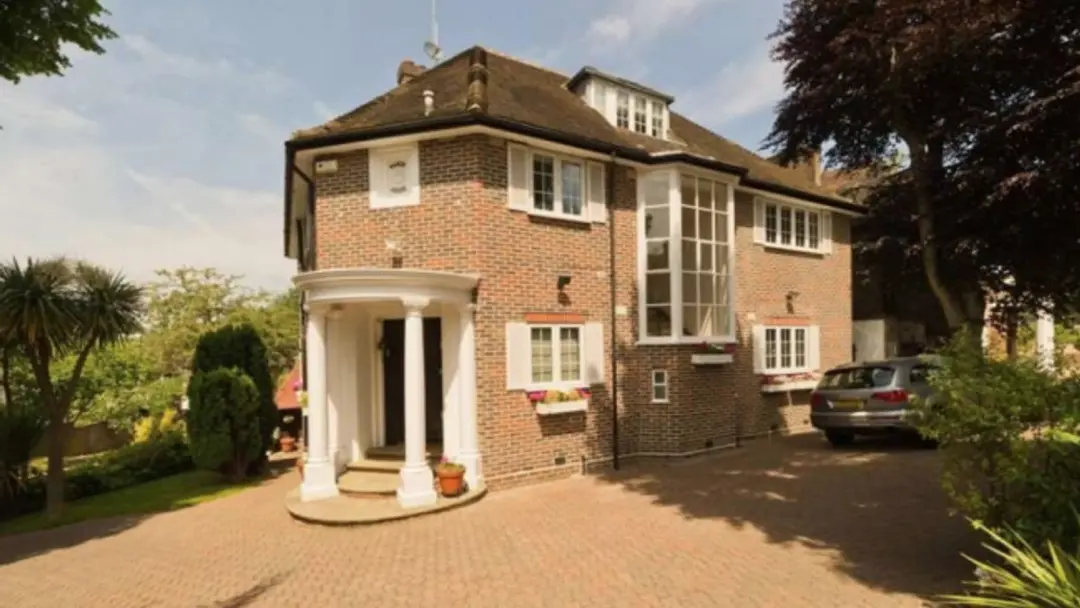 Jian Wen's mansion (Image | British Police)
Jian Wen's mansion (Image | British Police)
In the first half of 2018, the price of Bitcoin surged against the pound. By May 2018, 1 Bitcoin could be exchanged for over £5500, more than three times the value in May 2017. At the same time, the two individuals also set their sights on more real estate. In addition to the £23.5 million mansion, Jian Wen also attempted to help Qian Zhimin purchase two properties worth £4.5 million and £12.5 million, respectively.
However, along with the rising prices, the difficulty of the "housekeeper" job also increased, as Jian and Qian faced numerous obstacles in the process of converting Bitcoin to pounds and going through the approval process for purchasing property.
Nicholas Ryder, a professor of financial crime law at Cardiff University, who has served as an advisor to EU and UK government departments, told the magazine, "Bitcoin, as a financial innovation, is more inclusive, benefiting more people without bank accounts; but its high level of anonymity also makes it a favorite of fraudsters and terrorists. In theory, it makes it more difficult to identify real money launderers." However, increasingly advanced tracing and tracking technologies, as well as the UK tax authorities' monitoring of everyone's income, have made large-scale Bitcoin exchanges in the UK almost impossible to keep secret.
As a result, in the first eight months of 2018, Jian Wen visited at least ten European countries, including Austria, the Czech Republic, and Switzerland. She purchased jewelry worth tens of thousands of pounds locally and exchanged small amounts of Bitcoin for local currency both online and offline. Sometimes, Qian Zhimin would also accompany her, but the two almost never left behind a photo together. During her travels with Qian Zhimin, Jian Wen also searched the internet for keywords such as "China extradition treaty Sweden." In addition, Jian Wen made two trips to Thailand, each time returning with a new laptop. In subsequent investigations, the police found information related to Qian Zhimin's cryptocurrency wallet on the laptops. All these signs indicate that she was not unaware of her involvement in wrongdoing.
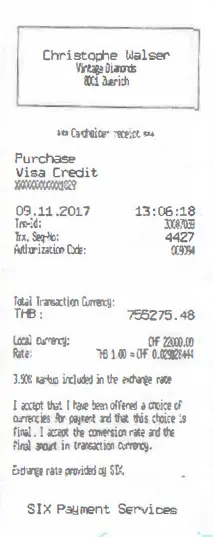 Receipt for Jian Wen's jewelry purchase (Image | British Police)
Receipt for Jian Wen's jewelry purchase (Image | British Police)
The exchange of small amounts of Bitcoin was not enough to quickly raise the funds needed to purchase the three properties. During her travels, Jian Wen, through her diverse network, met the principal of a problematic brokerage firm. This institution had obtained certification from the Financial Conduct Authority in the UK, but the principal was willing to exchange Bitcoin for cash without asking too many questions and directly provide a source of funds report suitable for purchasing property. The principal converted Jian Wen's Bitcoin into £850,000, and this money was about to be used as a deposit for the property purchase.
Jian Wen transferred the £850,000 to a well-known law firm recommended by Jackson, and the fund verification process began. Two British professors specializing in real estate and economic crime told the magazine that in the UK, in every property transaction, the buyer and seller are not allowed to transfer money to each other, but must do so through their respective lawyers, who represent both parties, to complete the transaction. Jackson said, "A client can say a lot, show a lot, but when it comes to the transaction, you must find a law firm and go through the firm's verification of identity and source of funds."
Subsequently, Jian Wen's communication with the lawyer repeatedly showed hesitation and inconsistencies in her statements. According to the prosecution's investigation records, in April 2018, Jian Wen told the law firm that the money she used to pay part of the property purchase came from Bitcoin "mined and gifted to her by Zhang Yadi." She also prepared a notarized certificate for receiving 3,000 Bitcoins as a gift.
However, the law firm was not satisfied with this explanation. In an email, the law firm mentioned to Jian Wen the newly enacted "Unexplained Wealth Order" in 2017. This meant that UK authorities could inquire about the source of funds used to purchase specific assets. If unable to explain, the buyer could potentially lose the asset completely and be subject to investigation.
The original intention of this law was to combat the hiding of illicit funds by oligarchs from the Middle East and Central Asia, as well as terrorist organizations in London, to supplement and strengthen the 2003 anti-money laundering regulations. Professor Ryder told the magazine that research by multiple independent institutions indicated that the UK has the best anti-money laundering legal framework in the world. The 2003 legal framework set passive criminal responsibility for relevant financial institutions in preventing money laundering crimes, while the "Unexplained Wealth Order" requires all banks, law firms, real estate agents, and other institutions in the UK to more actively understand their clients and their sources of funds, and report any potential risks.
According to the prosecution's report, when questioned by the law firm in July 2018, Jian Wen said that "Zhang Yadi" could not provide the source of the Bitcoin for security reasons. When pressed further, Jian Wen mentioned that if this was a requirement for the property purchase, they would not continue. Subsequently, Jian Wen turned to the more loosely regulated Dubai, where she exchanged the local currency for two properties.
However, the transfer of £850,000 still caught the attention of the Metropolitan Police's anti-money laundering detectives in London. According to the Financial Times, on October 31, 2018, after seizing this transfer, the British police arrived at Jian Wen and Qian Zhimin's residence with a search warrant. Several hours later, the police seized multiple laptops, including the one Qian Zhimin had brought into the UK. In addition, the confiscated items included several notebooks, £70,000 in cash, a pink USB drive containing various keys, and a handwritten note with a series of passwords.
In August 2020, when the police returned to their residence for a second search, they had already terminated the lease, and Qian Zhimin had fled. According to police records, Jian Wen retained a £40,000 rental deposit and a Mercedes E-Class car. Later, Jian Wen told the court that she had not seen Qian Zhimin since August 25, 2020.
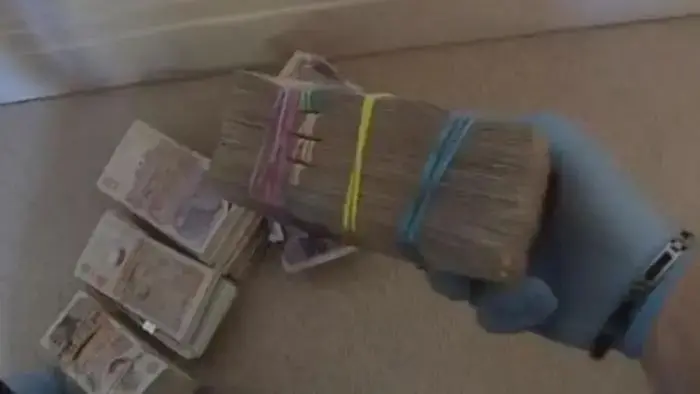 Large amount of cash found by the police at Jian Wen's home (Image | British Police)
Large amount of cash found by the police at Jian Wen's home (Image | British Police)
In May 2021, two and a half years after the initial search, the police arrested Jian Wen. Ryder told the magazine that, considering the protection of personal privacy and the shortage of investigators, it is not uncommon in the UK for arrests and prosecutions of "white-collar crimes" to take several years of investigation. Through the evidence seized, the police tracked and unlocked multiple Bitcoin wallets belonging to Qian Zhimin, containing a total of over 61,000 Bitcoins.
Jian Wen was arrested in a two-bedroom apartment in south London. She had returned to work at a restaurant and was living with her son. In the apartment, the police found a handwritten note: "I'll be dead if they break the BTC code."
免责声明:本文章仅代表作者个人观点,不代表本平台的立场和观点。本文章仅供信息分享,不构成对任何人的任何投资建议。用户与作者之间的任何争议,与本平台无关。如网页中刊载的文章或图片涉及侵权,请提供相关的权利证明和身份证明发送邮件到support@aicoin.com,本平台相关工作人员将会进行核查。



